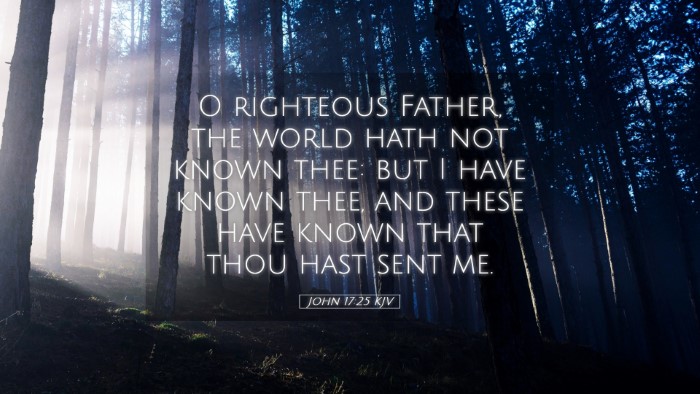Old Testament
Genesis Exodus Leviticus Numbers Deuteronomy Joshua Judges Ruth 1 Samuel 2 Samuel 1 Kings 2 Kings 1 Chronicles 2 Chronicles Ezra Nehemiah Esther Job Psalms Proverbs Ecclesiastes Song of Solomon Isaiah Jeremiah Lamentations Ezekiel Daniel Hosea Joel Amos Obadiah Jonah Micah Nahum Habakkuk Zephaniah Haggai Zechariah MalachiJohn 17:25
John 17:25 KJV
O righteous Father, the world hath not known thee: but I have known thee, and these have known that thou hast sent me.
John 17:25 Bible Commentary
Commentary on John 17:25
Bible Verse: “O righteous Father, the world has not known You; but I have known You; and these have known that You sent Me.” (John 17:25)
Introduction
This verse is part of the prayer of Jesus, commonly known as the High Priestly Prayer, which spans John 17. In this prayer, Jesus is speaking directly to the Father about His ministry, His disciples, and the world. This verse, in particular, highlights the distinction between the knowledge of God in Christ and the ignorance of the world.
Insights from Commentaries
The following insights draw upon the observations of eminent biblical scholars, including Albert Barnes, Matthew Henry, and Adam Clarke.
Albert Barnes' Insights
Barnes emphasizes the relational dynamic highlighted in this passage. He notes that Jesus identifies God as a "righteous Father," signifying a relationship grounded in inherent justice and moral rectitude. This acknowledgment leads to the implication that the world's failure to recognize God stems from its moral blindness.
- Righteousness of God: Barnes explains that the term "righteous" implies that God cannot condone sin and must punish iniquity, leading humanity to misunderstand His nature.
- Knowledge of God: Jesus asserts that He knows God intimately. This knowledge is relational and experiential, contrasting with the superficial understanding of God possessed by the world.
- Revelation of God: The acknowledgment of Jesus by His disciples, as opposed to the world's ignorance, is notable. Barnes articulates that the disciples' belief signifies a transformational knowledge that arises from faith.
Matthew Henry's Insights
Matthew Henry offers a pastoral angle, reflecting on the implications of knowing God. He sees the phrase "O righteous Father" as an address that reveals Jesus' intimate relationship with God, underscoring the theme of divine righteousness.
- Intimacy in Prayer: Henry points out that this prayer exemplifies the deep communion Jesus shares with the Father, indicative of His role as Mediator between God and humanity.
- The Ignorance of the World: The world’s inability to know God is rooted in its rebellion and sin. Henry shares that, despite the general revelation of God in creation, many choose to ignore the truth.
- Disciples as Witnesses: The phrase "and these have known" refers to Jesus' followers who have experienced the revelation and mission of God through Christ. This highlights the responsibility of believers to share this knowledge.
Adam Clarke’s Insights
Adam Clarke adds a theological and doctrinal dimension to this verse, focusing on the implications for understanding God’s nature and His relationship with humanity.
- Distinction of Knowledge: Clarke emphasizes the contrast between Christ's knowledge of God and the world's ignorance, suggesting that divine revelation is essential for true knowledge.
- Universal Ignorance: He notes that the worldly perception of God is often marred by misconceptions and false representations, calling for a deeper exploration of Scripture to understand God's attributes.
- Implications for Faith: Clarke asserts that a genuine relationship with God begins with this knowledge, which leads to a transformative faith. Knowledge of God is not just intellectual but involves trust and commitment.
Theological Implications
Understanding John 17:25 requires careful theological reflection:
- Nature of God: The term "righteous Father" affirms God's just nature. The righteousness of God must constantly inform a believer’s understanding of His love, justice, and mercy.
- The Role of Christ: Jesus’ role as the revealer of God is of utmost importance. The distinction made between the knowledge of Jesus and the ignorance of the world emphasizes the salvific nature of His mission.
- Responsibility of Believers: All who come to know Christ are called to bear witness to His nature, calling others out of ignorance to the truth of the Gospel.
Practical Applications
This verse holds significant applications for pastors, students, and scholars:
- Encouragement in Evangelism: A deeper understanding of the world's ignorance should propel believers toward compassion in outreach efforts.
- Deepening Discipleship: Believers are encouraged to pursue a deeper knowledge of God, moving beyond mere academic understanding to relational experience.
- Engagement in Worship: Recognizing God as "righteous Father" invites believers to worship with reverence, celebrating the relational dynamics within the Trinity.
Conclusion
John 17:25 encapsulates profound truths about the nature of God, the identity and mission of Jesus, and the condition of humanity's knowledge of God. As scholars, pastors, and students reflect upon this verse, it serves as a reminder of the transformative power of knowing God through Christ and the responsibility of those who have this knowledge to share it with the world.


